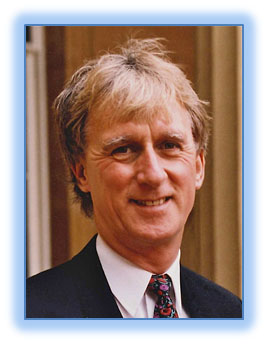Prof. Trevor Elliott
26th August 1949 - 28th January 2013
 Trevor Elliott, one of the most influential geoscientists of his generation, has died at the age of 63. He is survived by his life-long partner and wife, Marianne Elliott and son, Marc Elliott.
Trevor Elliott, one of the most influential geoscientists of his generation, has died at the age of 63. He is survived by his life-long partner and wife, Marianne Elliott and son, Marc Elliott.
Trevor was a man you felt lucky and incredibly fortunate to know. Time with Trevor was always keenly anticipated and his loss to a community of geologists that he taught, mentored and whom he considered extended family is deeply felt.
Trevor was staunchly proud of his Lancashire heritage and spent his childhood and completed his grammar school education in Bury, England in the 1950s and 1960s. His northwest accent would surface when he was most amazed.
His career path after completing school was always going to be geoscience and in 1970 he graduated in Geology from the University College of Swansea. His natural talent for geoscience and his extraordinary communication skills were recognised by his teachers at Swansea and by Harold Reading at the University of Oxford and he was recruited into an illustrious research group of graduate students that profoundly influenced the development of sedimentology in the 1970s. Within a year of his D.Phil from Oxford in 1974 he had published his much cited paper on 'Inter-distributary bay sequences and their genesis' and in 1978 he authored the chapters on Deltas and Shorelines in the seminal book: Sedimentary Environments and Facies. Trevor's early research focus on deltaic settings resulted in him being forever associated with deltas, despite his breadth of research spanning the next 40 years.
In the mid-late 1970s Trevor secured two prestigious postdoctoral fellowships, firstly from the Royal Society to spend a year at the University of Leiden, and then followed by three years at the University of Reading. By 1976 he had become Lecturer in Sedimentology at his former undergraduate department at the University College of Swansea. Here he started a long and productive teaching and supervisor career that resulted in numerous undergraduate, postgraduate and postdoctoral thesis and research projects. He was immensely proud of his students and their own achievements in academia and industry. Trevor was a mentor you wanted to please. One of his greatest legacies is the impact that his students have made and are still making in their companies and geology departments around the world.
In 1982 he was awarded a Fulbright Scholarship, which he spent as a visiting Professor at Iowa State University. On returning to the UK he was appointed George Herdman Professor of Geology at the University of Liverpool, a position he held for the next 22 years. Trevor was a Head of Department at Liverpool and was dedicated to undergraduate field teaching, whatever the other demands on his time. During his Herdman years he was awarded the Bigsby Medal from the Geological Society of London and was a Distinguished Lecturer of the American Association of Petroleum Geologists. He also was a visiting Professor at M.I.T. during 1997-1998.
Throughout his academic career Trevor was always willing to give back. He acted as an external undergraduate and postgraduate examiner at numerous UK and overseas geoscience departments and was an editor and/or external assessor for Professional Societies, Universities and Government Departments.
Trevor decided to pursue full time consulting and training in 2006, building on close interactions he had always cultivated with industry. His decision to retire early from University life was not an easy one, but he subsequently reveled in a post-academic honeymoon period that saw him develop and teach exceptional and highly rated industry classes in sedimentology and stratigraphy and touch a vast new community of geoscientists and engineers. His involvement with industry stretched back to the late 1970s when Harold Reading, John Collinson and Trevor launched Sedimentary Research Associates, delivering some of the earliest and most innovative sedimentary and reservoir schools to petroleum professionals.
Trevor's own research interests spanned fluvial to deepwater stratigraphy, sedimentology and basin analysis. His forte was always in the primary processes of sedimentation and he considered that everything should be based ultimately on first principles. His students will testify that his greatest strengths were in his scientific methods and teaching style. His keen insight, rigourous analytical mind and ability to engage with everyone irrespective of experience were a delight to witness. Anyone who shared time with him will recall his extraordinary use of his hands to express ideas and concepts. Trevor will also be remembered for his distinctive dress style, particularly in the field. His counter-conventional choice of bright and pastel colours and his ability to remain spotless even on wet and muddy field days are legend amongst his colleagues and students.
Trevor has been taken from us too early and his valiant fight with an aggressive cancer was an unfair ending to a wonderful life. I am heartened by the vivid memories of many enthusiastic field days full of the anticipation of some new discovery and the time spent with a true gentlemen of geology. His love of, and passion for, field geology is a strength that will endure through a fieldwork scholarship, which has been created in his name.
All of us will remember Trevor Elliott with love and great fondness and we will smile every time we get an unexpected sunny day in the field.
Andy Pulham, and on behalf of all of 'Elliott's' students.


